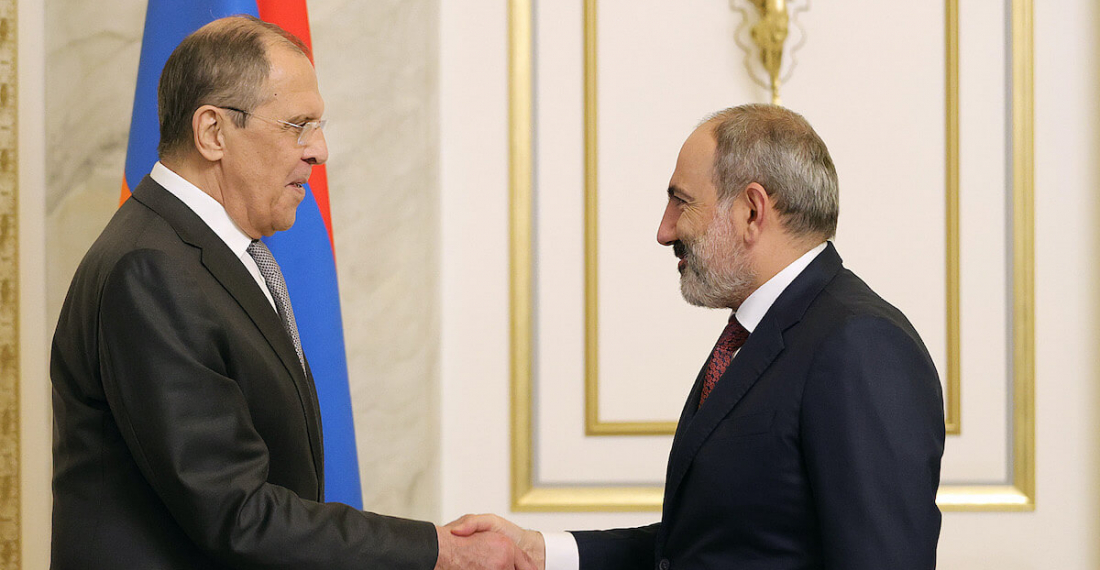The acting prime minister of Armenia, Nikol Pashinyan, yesterday (6 May) thanked the Russian foreign minister, Sergei Lavrov, for Russia’s support in issues related to both the pandemic and last year’s 44-day Karabakh war; whilst placing emphasis on the need for the resumption of the peace process to reach a final settlement to the conflict. Lavrov was in Yerevan on 5-6 May for meetings with Armenian officials.
Receiving the Russian delegation led by the foreign minister, the acting Armenian prime minister drew attention to the strengthening relationship between the two countries. He highlighted Russia’s efforts to halt last year’s hostilities to achieve a “tangible reduction in regional tensions”, referring to the presence of the Russian military contingent, deployed in Nagorno-Karabakh on a peacekeeping mission, as “a powerful pledge of security”.
Pashinyan drew attention to the personal role of the Russian president, Vladimir Putin, in “reinstating peace in the region” before giving assurances that Armenia will do all it can to implement the agreements reached through the trilateral statements of 10 November 2020 and 11 January 2021.
Pashinyan warned that Azerbaijani action was, however, jeopardising the prospects for peace, citing in particular the ongoing detention of Armenian citizens; "fomenting Armenophobia"; the making of territorial claims on Armenia; and the destruction of Armenian cultural heritage. In this context, he “noted with satisfaction” steps by the Co-Chairs of the OSCE Minsk Group, saying that their recent statement "came as a strong response to Azerbaijan’s non-constructive stance". Like the Armenian foreign minister, who also spoke with Lavrov yesterday, Pashinyan said that the Co-Chairs’ position outlined by their 13 April statement aligned with Armenia's approach to the current challenges – “the peace process needs to be resumed in order to reach a final settlement of the Nagorno-Karabakh conflict, based on the principles proposed by the Co-Chairs”, he said.
After thanking Pashinyan for his words and acknowledgements, Lavrov too placed emphasis on the strengthening relationship between two countries, affirming Russia’s commitment to Armenia’s security.
He expressed Russia’s support for the work of the trilateral working group – co-chaired by Armenia, Azerbaijan and Russia’s deputy prime ministers – which is currently engaged in “unblocking economic and transport communications, which will make it possible to end the blockade of Armenia and ensure mutually beneficial interaction of all countries in the region for the common benefit in practice”. He appeared to reiterate what he had said in the earlier joint press conference with the acting Armenian foreign minister – that the trilateral working group was working on practical solutions, “not only at the political level, as this has already been done”.
The Russian diplomat acknowledged the role of the Russian military contingent in Nagorno-Karabakh in ensuring the region’s security. He pledged that they would do their best to “resolve remaining issues” related to “determining the exact line of contact [and] achieving mutually beneficial agreements on its passage”. He noted that the delimitation and demarcation of the Armenian-Azerbaijani border would be possible after all these steps were implemented. He stated the Russian intention of addressing these problems in all formats by “implementing the trilateral statements”. He also said that Russia would “stimulate the activities of the OSCE Minsk Group Co-Chairs in order to build the most favourable atmosphere conducive to the settlement of the remaining issues”.
During his visit to Armenia, press offices report that the Russian foreign minister discussed with the acting Armenian prime minister Armenian-Russia co-operation, the situation in Nagorno-Karabakh, and the settlement of humanitarian issues, whilst also sharing his conversations conducted with the acting Armenian foreign minister. Lavrov also reportedly shared with Pashinyan his impressions of the ‘Armenian Genocide Memorial’, which he visited yesterday (6 May) morning.
On 10-11 May, Lavrov will visit Baku.



